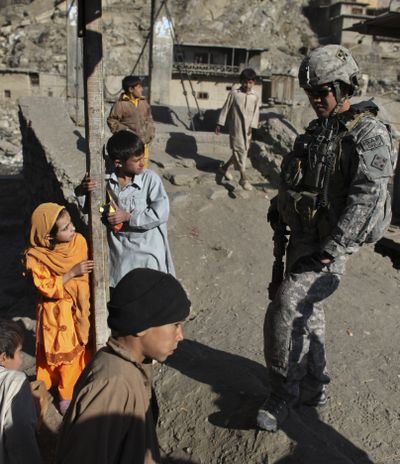U.S. will put limits on raids
Move aimed at easing anger among Afghan civilians

KABUL, Afghanistan – NATO forces in Afghanistan are preparing to limit night raids on private homes, even if it means losing some tactical advantage, to curb rising public anger.
NATO spokesman Rear Adm. Gregory Smith told the Associated Press in an exclusive interview that a directive would be issued soon to set down the new rules.
Nighttime raids on private homes have emerged as the Afghans’ No. 1 complaint after Gen. Stanley McChrystal limited the use of airstrikes and other weaponry last year. The U.S. and allied nations have made protecting the population a priority over the use of massive firepower as they seek to undermine support for the Taliban.
“It addresses the issue that’s probably the most socially irritating thing that we do – and that is entering people’s homes at night,” Smith said Wednesday at his office in Kabul. He would not elaborate pending a formal announcement.
The U.S.-led force has become increasingly sensitive to complaints by Afghan civilians as part of a renewed effort to win support among the public and lure people away from the Taliban. Night operations risk offending Afghan sensitivity about men entering homes where women are sleeping.
Rafiullah Khiel, a Finance Ministry employee whose uncle was detained by NATO forces during a night raid last fall, said the distraught women and children in the compound were rounded up and locked in a watchtower for several hours while soldiers searched the dwellings. Khiel said the soldiers told the family that they had information that the uncle, a pharmacist, was treating Taliban fighters.
“This is just unacceptable to us, to our traditions,” Khiel said, holding back tears as he recounted the ordeal during an interview in a home on the outskirts of Kabul. “These kinds of actions, these wrong decisions, just make people turn against them.”
The inability of the Afghan government to stop what many of its constituents consider abuse in turn generates support for the militants.
Smith said complaints about civilian deaths from airstrikes had dropped sharply after McChrystal’s order last year, but Afghans are “not seeing enough difference in our nighttime operations.”